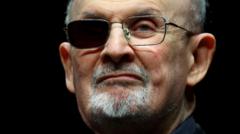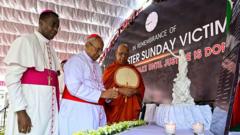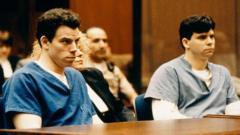Salman Rushdie detailed his harrowing experience of being stabbed and the moment he believed he was dying while testifying against his alleged attacker in a New York court.
**Salman Rushdie Describes Near-Death Experience During Court Testimony**

**Salman Rushdie Describes Near-Death Experience During Court Testimony**
Renowned Author Recalls Stabbing Incident in Chautauqua as Alleged Attacker Faces Justice
Sir Salman Rushdie, the award-winning author, recounted his near-fatal attack during a court hearing in New York where he is seeking justice against Hadi Matar, the man accused of stabbing him. The incident took place on August 12, 2022, when the 77-year-old author was giving a lecture at the Chautauqua Institution.
Testifying in court, Rushdie described the moment he realized he was in grave danger, recalling how he saw an individual rushing towards him, dressed in dark clothing and a face mask. “I felt the first blow to my jaw and neck and initially thought I had been punched,” he said, shocked as he saw blood seeping onto his clothes.
In a chilling recount, Rushdie explained that he was struck 15 times, suffering serious injuries to his eye, neck, and torso, leaving him with significant scars and permanently impaired vision in one eye. “There’s no vision in the eye at all,” he told the jury, speaking about the severe impact of the attack. The incident, he stated, unfolded in mere seconds, yet it felt like an eternity as he experienced intense pain and fear.
Rushdie's wife, Lady Rushdie, was seen in tears as her husband recounted the traumatic ordeal. Even after years of living under the shadow of threats due to the controversy surrounding his novel *The Satanic Verses*, which was accused of blasphemy, he felt a fleeting sense of safety before the attack disrupted his relatively normal life.
In the aftermath, he described a feeling of lying in a “lake of blood,” with a genuine belief that he was on the brink of death. He credited bystanders with subduing Matar, thus saving his life. Following the attack, Rushdie was airlifted to receive medical attention for 17 days.
During cross-examination by Matar’s attorney, Rushdie maintained his recollection of the events, despite acknowledging that trauma can occasionally distort memories. He asserted that while he had no previous interactions with Matar, he vividly remembered both the extent of his injuries and the attacker’s demeanor during the assault.
Further testimonies will follow in the trial, including that of the surgeon who treated Rushdie, as the legal proceedings continue in a case that has captured global attention.





















